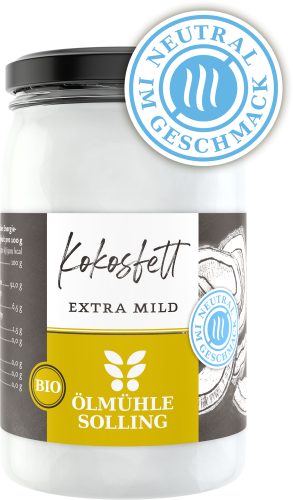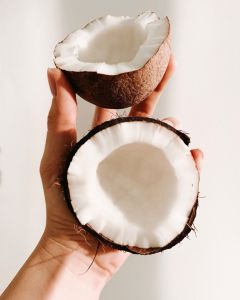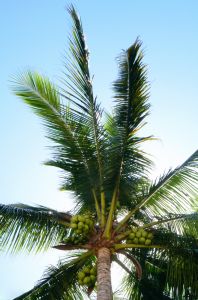ORGANIC Coconut oil
virgin


- gently steamed
- tasteless and odorless
- extremely versatile
- highly heatable
from 90 ratings




The deodorized coconut fat from Ölmühle Solling comes from fully ripe coconuts from organic farmers in the Philippines. The coconut fat is obtained from the dried pulp (copra) of the coconut. It is then gently deodorized using steam.
Difference to virgin coconut oil: processing and taste
Nutritionally, deodorized coconut oil does not differ significantly from virgin coconut oil. The main difference is in the processing and taste. Unlike virgin coconut oil, which has an intense coconut scent and flavor, deodorized coconut oil is tasteless and odorless.
In the process of deodorization, we deliberately avoid chemical procedures. The deodorization of the coconut fat is purely mechanical and takes place exclusively with the help of steam. The gentle steaming of the coconut fat removes the typical flavor and odor substances of the coconut. The deodorized coconut fat is therefore particularly suitable for the preparation of dishes that should not be influenced by an intensive coconut note, neither in taste nor in smell.
Coconut fat is heat resistant
Both virgin and deodorized coconut oil have similar heat-resistant properties, as they consist mainly of saturated fatty acids. Saturated fatty acids are more stable at high temperatures compared to unsaturated fatty acids. Coconut oil has a high smoke point, which is the point at which the oil begins to smoke and decompose. It is usually between 177 °C and 204 °C. For this reason, both virgin and deodorized coconut oil are excellent for cooking, frying, baking and grilling. They retain their stability and nutrients relatively well even when heated. In principle, however, oils should not be heated above their smoke point, as this can lead to the formation of harmful substances.

Tree of Life provides nuts with valuable ingredients
In terms of nutritional composition, both virgin and deodorized coconut oil contain similar amounts of saturated fatty acids, particularly medium chain triglycerides (MCTs). MCTs are considered easily digestible fats that can be quickly converted into energy by the body. Coconuts are a very nutritious food, they contain fiber, vitamins and minerals. In addition to the nuts, the coconut palm also provides fuel and building material. Therefore, it is called Tree of Life, because it is considered the most important crop in the tropics.
Virgin or deodorized: A personal choice
The choice between virgin and deodorized coconut oil depends on personal preferences and requirements. If the taste and smell of coconut oil are important to you, choose a virgin coconut oil. Deodorized coconut oil is an optimal option for those who want the benefits of coconut oil but want to avoid the strong coconut taste and smell.
Solid and liquid: A matter of temperature
At room temperature, coconut oil is usually solid. The melting point is usually between 24°C and 26°C. If the ambient temperature is above this point, the coconut oil begins to melt and becomes liquid. There is often an assumption that coconut fat is always solid and coconut oil is always liquid. In principle, coconut fat and coconut oil are not different products. The consistency of coconut fat has no influence on its quality and usability.
Production of coconut fat: Particularly sustainable
Coconut oil is produced from ripe coconuts. The outer shell of the coconut is first removed by hand and then the flesh is extracted. Now the pulp is shredded into coconut flakes, which are then dried. The dried pulp is called copra. After the copra is gently cold pressed, the oil is mildly steamed. The result is a deodorized coconut oil.
The production of coconut fat at Ölmühle Solling is particularly sustainable, as there is no waste and every part of the valuable product is used.
- The press cake is processed into fine organic coconut flour.
- The coconut puree, which remains as sediment in the barrel, is bottled and serves as a delicious spread.
In addition to the deodorized coconut fat, the organic manufactory also offers two virgin coconut oils: the organic coconut oil Naturland Fair, in which the seed skin is also processed, and the virgin organic coconut oil, which is produced without seed skin. In addition, the sweet and caramel coconut blossom sugar is produced from the nectar of the coconut blossom bud.
Usage
The gently steamed coconut fat is well suited for applications where the typical inherent taste should not be influenced, such as in savory dishes, stews and soups, vegetable and fish dishes or desserts. Coconut fat is particularly heat-resistant. It is ideal for frying, baking and deep-frying. It is also a fine ingredient in sauces.





 Coconut oil
Coconut oil Coconut oil
Coconut oil Coconut butter
Coconut butter